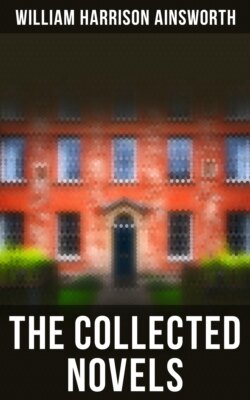Читать книгу The Collected Novels - William Harrison Ainsworth - Страница 80
На сайте Литреса книга снята с продажи.
CHAPTER 7
THE YORK STAGE
ОглавлениеTable of Contents
York, Four Days!—Stage Coach begins on Friday, the 18th of April, 1706. All that are desirous to pass from London to York, or from York to London, or any other place on that road, let them repair to the Black Swan, in Holborn, in London, or to the Black Swan, in Coney Street, in York. At both which places they may be received in a Stage Coach, every Monday, Wednesday, and Friday, which performs the journey in four days — if God permits! — and sets forth at five in the morning. And returns from York to Stamford in two days, and from Stamford, by Huntingdon, in two days more. And the like stages in their return. Allowing each passenger fourteen pounds’ weight, and all above, three pence per pound. Performed by Benjamin Kingman, Henry Harrison, and Waller Baynes. —Placard, preserved in the coffee-room, of the Black Swan Inn at York.
The night had hitherto been balmy and beautiful, with a bright array of stars, and a golden harvest moon, which seemed to diffuse even warmth with its radiance; but now Turpin was approaching the region of fog and fen, and he began to feel the influence of that dank atmosphere. The intersecting dykes, yawners, gullies, or whatever they are called, began to send forth their steaming vapors, and chilled the soft and wholesome air, obscuring the void, and in some instances, as it were, choking up the road itself with vapor. But fog or fen was the same to Bess; her hoofs rattled merrily along the road, and she burst from a cloud, like Eöus at the break of dawn.
It chanced, as he issued from a fog of this kind, that Turpin burst upon the York stage coach. It was no uncommon thing for the coach to be stopped; and so furious was the career of our highwayman, that the man involuntarily drew up his horses. Turpin had also to draw in the rein, a task of no little difficulty, as charging a huge, lumbering coach, with its full complement of passengers, was more than even Bess could accomplish. The moon shone brightly on Turpin and his mare. He was unmasked, and his features were distinctly visible. An exclamation was uttered by a gentleman on the box, who, it appeared, instantly recognized him.
“Pull up — draw your horses across the road!” cried the gentleman; “that’s Dick Turpin, the highwayman. His capture would be worth three hundred pounds to you,” added he, addressing the coachman, “and is of equal importance to me. Stand!” shouted he, presenting a cocked pistol.
This resolution of the gentleman was not apparently agreeable, either to the coachman or the majority of the passengers — the name of Turpin acting like magic upon them. One man jumped off behind, and was with difficulty afterwards recovered, having tumbled into a deep ditch at the roadside. An old gentleman with a cotton nightcap, who had popped out his head to swear at the coachman, drew it suddenly back. A faint scream in a female key issued from within, and there was a considerable hubbub on the roof. Amongst other ominous sounds, the guard was heard to click his long horse-pistols. “Stop the York four-day stage!” said he, forcing his smoky voice through a world of throat-embracing shawl; “the fastest coach in the kingdom: vos ever such atrocity heard of? I say, Joe, keep them ere leaders steady; we shall all be in the ditch. Don’t you see where the hind wheels are? Who — whoop, I say.”
The gentleman on the box now discharged his pistol, and the confusion within was redoubled. The white nightcap was popped out like a rabbit’s head, and as quickly popped back on hearing the highwayman’s voice. Owing to the plunging of the horses, the gentleman had missed his aim.
Prepared for such emergencies as the present, and seldom at any time taken aback, Dick received the fire without flinching. He then lashed the horses out of his course, and rode up, pistol in hand, to the gentleman who had fired.
“Major Mowbray,” said he, in a stern tone, “I know you. I meant not either to assault you or these gentlemen. Yet you have attempted my life, sir, a second time. But you are now in my power, and by hell! if you do not answer the questions I put to you, nothing earthly shall save you.”
“If you ask aught I may not answer, fire!” said the major; “I will never ask life from such as you.”
“Have you seen aught of Sir Luke Rookwood?” asked Dick.
“The villain you mean is not yet secured,” replied the major, “but we have traces of him. ’Tis with a view of procuring more efficient assistance that I ride to town.”
“They have not met then, since?” said Dick, carelessly.
“Met! whom do you mean?”
“Your sister and Sir Luke,” said Dick.
“My sister meet him!” cried the major, angrily —“think you he dares show himself at Rookwood?”
“Ho! ho!” laughed Dick —“she is at Rookwood, then? A thousand thanks, major. Good night to you, gentlemen.”
“Take that with you, and remember the guard,” cried the fellow, who, unable to take aim from where he sat, had crept along the coach roof, and discharged thence one of his large horse-pistols at what he took to be the highwayman’s head, but which, luckily for Dick, was his hat, which he had raised to salute the passengers.
“Remember you,” said Dick, coolly replacing his perforated beaver on his brow; “you may rely upon it, my fine fellow, I’ll not forget you the next time we meet.”
And off he went like the breath of the whirlwind.
